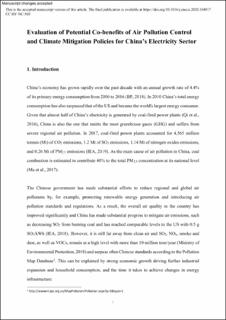Please use this identifier to cite or link to this item:
https://doi.org/10.21256/zhaw-21489Full metadata record
| DC Field | Value | Language |
|---|---|---|
| dc.contributor.author | Wei, Xinyang | - |
| dc.contributor.author | Tong, Qing | - |
| dc.contributor.author | Magill, Iain | - |
| dc.contributor.author | Vithayasrichareon, Peerapat | - |
| dc.contributor.author | Betz, Regina | - |
| dc.date.accessioned | 2021-01-28T13:35:05Z | - |
| dc.date.available | 2021-01-28T13:35:05Z | - |
| dc.date.issued | 2020-10 | - |
| dc.identifier.issn | 0140-9883 | de_CH |
| dc.identifier.issn | 1873-6181 | de_CH |
| dc.identifier.uri | https://digitalcollection.zhaw.ch/handle/11475/21489 | - |
| dc.description.abstract | Since the rapid industrialisation, local air pollution has become one of China's most important environmental issues. In consequence, increasingly stringent air pollution control policies have been established by the Chinese government. These policies will inevitably affect China's future electric power investment given the key contribution of this sector to air pollution. This sector is also a key contributor to China’s greenhouse gas emissions and hence climate policy efforts. We present a study exploring what impacts of potential interactions and combinations of different policy efforts for local air pollutant control and carbon mitigation have on China's future electricity generation mix. The study utilises a novel generation portfolio model that explicitly incorporates key uncertainties in future technology costs and different policy approaches including carbon pricing and air emissions control. The findings highlight that China can achieve significant reductions for both greenhouse gas and local air pollutant emissions through a combination of climate change and air pollution control policies. Furthermore, there are potentially significant co-benefits from the perspectives of both air pollutant control and carbon mitigation and, notably, that the co-benefit from a sufficient carbon pricing policy to air pollution emission reductions is much stronger than that from stringent air pollutant control policies to carbon mitigation. Specifically, in order to achieve substantial local air pollution and greenhouse gas mitigation from China's electricity sector, it is necessary to close coal-fired power plants rather than merely seeking to clean their air pollution emissions up. | de_CH |
| dc.language.iso | en | de_CH |
| dc.publisher | Elsevier | de_CH |
| dc.relation.ispartof | Energy Economics | de_CH |
| dc.rights | http://creativecommons.org/licenses/by-nc-nd/4.0/ | de_CH |
| dc.subject | Air pollution | de_CH |
| dc.subject | China | de_CH |
| dc.subject | Co-benefits | de_CH |
| dc.subject | Electricity sector | de_CH |
| dc.subject.ddc | 363: Umwelt- und Sicherheitsprobleme | de_CH |
| dc.title | Evaluation of potential co-benefits of air pollution control and climate mitigation policies for China's electricity sector | de_CH |
| dc.type | Beitrag in wissenschaftlicher Zeitschrift | de_CH |
| dcterms.type | Text | de_CH |
| zhaw.departement | School of Management and Law | de_CH |
| zhaw.organisationalunit | Zentrum für Energie und Umwelt (CEE) | de_CH |
| dc.identifier.doi | 10.1016/j.eneco.2020.104917 | de_CH |
| dc.identifier.doi | 10.21256/zhaw-21489 | - |
| zhaw.funding.eu | No | de_CH |
| zhaw.issue | 104917 | de_CH |
| zhaw.originated.zhaw | Yes | de_CH |
| zhaw.publication.status | acceptedVersion | de_CH |
| zhaw.volume | 92 | de_CH |
| zhaw.embargo.end | 2022-09-04 | de_CH |
| zhaw.publication.review | Peer review (Publikation) | de_CH |
| zhaw.webfeed | W: Spitzenpublikation | de_CH |
| zhaw.author.additional | No | de_CH |
| zhaw.display.portrait | Yes | de_CH |
| Appears in collections: | Publikationen School of Management and Law | |
Files in This Item:
| File | Description | Size | Format | |
|---|---|---|---|---|
| 2021_Wei-etal_Co-benefits-of-air-pollution-control.pdf | Accepted Version | 769.22 kB | Adobe PDF |  View/Open |
Show simple item record
Wei, X., Tong, Q., Magill, I., Vithayasrichareon, P., & Betz, R. (2020). Evaluation of potential co-benefits of air pollution control and climate mitigation policies for China’s electricity sector. Energy Economics, 92(104917). https://doi.org/10.1016/j.eneco.2020.104917
Wei, X. et al. (2020) ‘Evaluation of potential co-benefits of air pollution control and climate mitigation policies for China’s electricity sector’, Energy Economics, 92(104917). Available at: https://doi.org/10.1016/j.eneco.2020.104917.
X. Wei, Q. Tong, I. Magill, P. Vithayasrichareon, and R. Betz, “Evaluation of potential co-benefits of air pollution control and climate mitigation policies for China’s electricity sector,” Energy Economics, vol. 92, no. 104917, Oct. 2020, doi: 10.1016/j.eneco.2020.104917.
WEI, Xinyang, Qing TONG, Iain MAGILL, Peerapat VITHAYASRICHAREON und Regina BETZ, 2020. Evaluation of potential co-benefits of air pollution control and climate mitigation policies for China’s electricity sector. Energy Economics. Oktober 2020. Bd. 92, Nr. 104917. DOI 10.1016/j.eneco.2020.104917
Wei, Xinyang, Qing Tong, Iain Magill, Peerapat Vithayasrichareon, and Regina Betz. 2020. “Evaluation of Potential Co-Benefits of Air Pollution Control and Climate Mitigation Policies for China’s Electricity Sector.” Energy Economics 92 (104917). https://doi.org/10.1016/j.eneco.2020.104917.
Wei, Xinyang, et al. “Evaluation of Potential Co-Benefits of Air Pollution Control and Climate Mitigation Policies for China’s Electricity Sector.” Energy Economics, vol. 92, no. 104917, Oct. 2020, https://doi.org/10.1016/j.eneco.2020.104917.
Items in DSpace are protected by copyright, with all rights reserved, unless otherwise indicated.